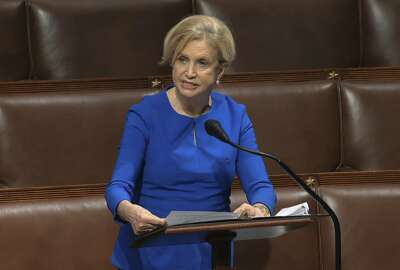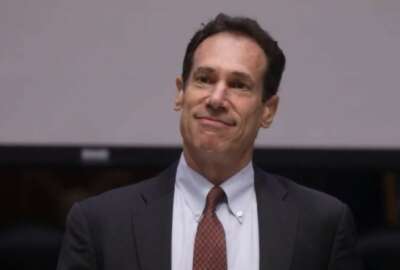
POGO: Existing whistleblower protections may not always protect policy dissent
Several federal agencies operate so-called dissent channels for employees can express disagreement with policies or policy proposals. But a watchdog group said ...
Best listening experience is on Chrome, Firefox or Safari. Subscribe to Federal Drive’s daily audio interviews on Apple Podcasts or PodcastOne.
Several federal agencies operate so-called dissent channels. Those are ways that employees can express disagreement with policies or policy proposals. The Project on Government Oversight looked closely at those channels at six different agencies. For more on what they found, Federal Drive with Tom Temin spoke with POGO Senior Investigator Nick Schwellenbach.
Interview transcript:
Tom Temin: When we talk about dissent channels, are these the same or separate from channels where whistleblowers might report wrongdoing? Or is there some overlap?
Nick Schwellenbach: So they are distinct from what we generally would consider safe and protected channels for whistleblowers. Those are typically hotlines that inspectors general offices or going to the Office of Special Counsel where I used to work. These dissent channels are run by the agency themselves, and they’re generally there for people to express some sort of disagreement, criticism or actually even to propose policies at the agency and policy disagreements or, you know, coming up with policy ideas. Sometimes overlaps with what’s considered protected whistleblowing, but often it does not.
Tom Temin: Because you could think of policy is something driven by the particular administration, like we’re going to do this, with regard to the nation of Chad, versus that, relation to the nation of Chad. And that could be driven by party politics. That’s one kind of policy. But then there’s also the policy, how are we going to distribute this aid? What rules will we propose? And that’s where differences in outcome or maybe lack of mission delivery could occur? And is that usually what is meant by policy disagreement?
Nick Schwellenbach: Well, policy disagreements can involve the policy priorities of any given administration that you know, are driven from sort of the White House level or the leadership level inside of an agency. But policy disagreements, yeah, can also involve policies that are really not political in nature at all. And when we talk about policy dissent, we’re talking about dissent that’s driven from sort of professional expertise. Now, sometimes someone’s preferred policy direction may line up with one political party or ideology or, or not. But the kind of policy dissent we’re mostly talking about is, is really one that’s rooted in someone’s expertise. For example, a diplomat in the State Department saying that, you know, maybe a food distribution policy involving an African country should be implemented in a different way to lead to a better outcome. But sometimes it can also, you know, be regarding policies that are driven from the White House level as well.
Tom Temin: Or it could be somewhere where you have disagreements between, say, a proposed policy in the industry – I’m thinking of the EPA, for example. It should be five parts per million, but the policy is we’ll leave it at seven. And someone that might be an expert scientist in this area says, well, I think it should be three. That kind of thing comes up, too.
Nick Schwellenbach: Yeah, absolutely. That kind of scientific disagreement in the policy context happens all the time. I mean, often there’s what’s legal and then there’s sort of the realm of the policy. And there’s a lot, there can be a lot of dispute within that. Some of it informed by expertise, much of it should be informed by expertise. And so one of our big messages in this report is leaders inside of agencies, be they top career officials or top political appointees, should embrace dissent and actually create a culture that encourages dissent that’s constructive in nature. Because those people on the rank and file level who are the experts on an issue, they could help leaders avoid bad decisions that could lead to bad outcomes that could blow up in their face and lead to a lot of bad headlines down the road.
Tom Temin: Sure. We’re speaking with Nick Schwellenbach. He’s senior investigator at the Project On Government Oversight. So tell us about the channels you looked at and what did you find in reality of how well they work in terms of protecting the people that do dissent and so on?
Nick Schwellenbach: So the reality is that they tend to be rarely used. We looked at the State Department, we looked at the Nuclear Regulatory Commission, the Energy Department, the FDA, USAID and NASA – those are the six agencies we focused on. There are a few other agencies that have channels such as the Federal Reserve System has channels now, but those are very recent. There’s not enough information to really look at them. But in our review, we focus predominantly on State and NRC. And they’re not used very often. One reason people inside government or former officials told us is some of them felt they might be retaliated against for using them. A few people have reported over the years they have faced retaliation. But the overwhelming reason why people don’t use the same channels, according to the people we’ve talked to, is they don’t think it would make a difference. In reviewing the public record, we didn’t really find really that many examples of use of dissent channel, either leading to a tangible policy change or leading to a serious reconsideration of policies. If your standard is it has to always lead to a policy change I think that’s the wrong standard. Sometimes a rank and file employee might not have all the considerations before them. But if they have a really good policy dissent, it should at least be seriously considered by the higher ups.
Tom Temin: So basically, people probably want, if they can’t change the policy, at least to know that they’re heard and that their idea was given respectful consideration.
Nick Schwellenbach: Yeah, absolutely. And that’s something that we see in the whistleblower context as well. And so it doesn’t mean that policy to sit never leads to change. It’s just that policy dissent as expressed through dissent channels, we haven’t really seen it at least publicly. There may be things we don’t know. But a lot of times people also go to the press, you know, as anonymous sources, sometimes who are named or not named. Sometimes they go to Congress. And so using those other means, I think sometimes policy dissent does change things, but not through these dissent channels by and large.
Tom Temin: So what should agencies do to make them – I mean, the title of your report is called “Stifling Dissent.” It sounds like more neglecting it, maybe, than stifling it.
Nick Schwellenbach: Right, right. Most agencies that have them seem to have neglected them. For example, USAID may be the most stark example of this. During the Obama administration, USAID created what’s called the direct channel, which is sort of an offshoot of the descent channel at State. And the direct channel is open to employees, government employees, as well as contractors, and they can apparently disagree about virtually any policy that USAID has. However, there’s essentially no information about the direct channel anywhere on the USAID’s website. You know, we had to dig through, like layers and layers and layers of the website to find any even mention of it. So it’s apparently been neglected. The person who ran the direct channel during the Obama administration told us that one of their biggest regrets regarding the direct channel is not really even advertising it.
Tom Temin: Well, you have several recommendations for agencies to invigorate these types of channels. And what are the chief ones?
Nick Schwellenbach: So one is a lot more transparency. For example, I think one model in terms of transparency is the Nuclear Regulatory Commission. They provide a whole host of information online about the dissents. They create some – an unclassified summary. I mean, these are involving nuclear power plants, so sometimes the issues can be sensitive, but they are fairly transparent about what the disagreement was over, how it was resolved. And that’s a model that we think should be used by other agencies that have dissent channels. You know, of course, some agencies like State deal with a lot of sensitive issues. Maybe not all the details can be made public or should be made public, but in some sort of unclassified form, at least once a year, there should be some public information, as well as statistics about how often the channels were used, and how often users say they felt they were retaliated against for using these channels. And if they were retaliated, and there were investigations into those claims, what were the outcome of those investigations? Another main recommendation is there should be some appeal mechanism within the dissent channel. So if an employee disagrees with a policy or policy proposal or proposes a policy, and it’s rejected, they should have an opportunity to have a second crack to say, “Hey, you know, we saw your response. We respectfully disagree, and here’s why.” And someone independent of that initial decision change should take a look at that. So some of our other recommendations are more for Congress. One of the big ones is sort of expanding or at least clarifying what are protected communications within the executive branch regarding policy disagreements. So there is a prohibited personnel practice that at least on paper seems to protect use of dissent channels, 5 USC 2302(b)(9), but the Office of Special Counsel where I used to work says it’s untested whether or not that legal provision would actually protect people for using dissent channels.
Tom Temin: Sure.
Nick Schwellenbach: That said, agencies that have dissent channels usually say as a matter of agency policy, you’re protected for using it. But there are limits to agency-derived protections.
Tom Temin: And by the way, do any DoD agencies, defense agencies have these types of channels?
Nick Schwellenbach: So there have been some proposals. One was last year and another again this year, a member of Congress, Dan Kildee (D-Mich.) has offered an amendment to the National Defense Authorization Act that would create a dissent channel within the national security arena, which would include DoD. It wasn’t successful last year. I don’t believe it was successful this year. There may be in the intelligence community some sort of dissent kind of mechanisms, but we weren’t really able to find public information regarding that.
Jared Serbu: Nick Schwellenbach is senior investigator at the Project On Government Oversight. We’ll post this interview along with a link to his findings at FederalNewsNetwork.com/FederalDrive. And you can hear the Federal Drive on demand. Subscribe at Apple Podcasts or Podcastone.
Copyright © 2024 Federal News Network. All rights reserved. This website is not intended for users located within the European Economic Area.
Tom Temin is host of the Federal Drive and has been providing insight on federal technology and management issues for more than 30 years.
Follow @tteminWFED
Related Stories





